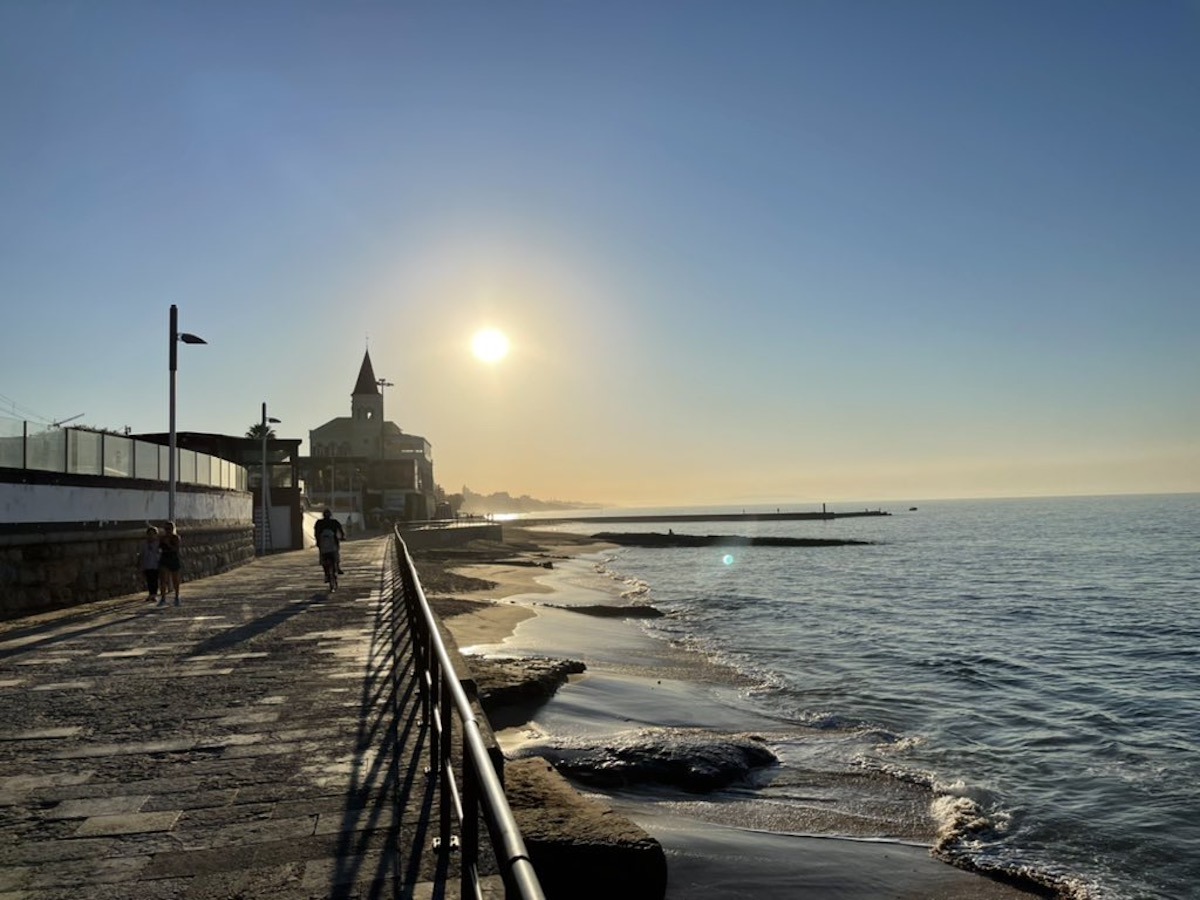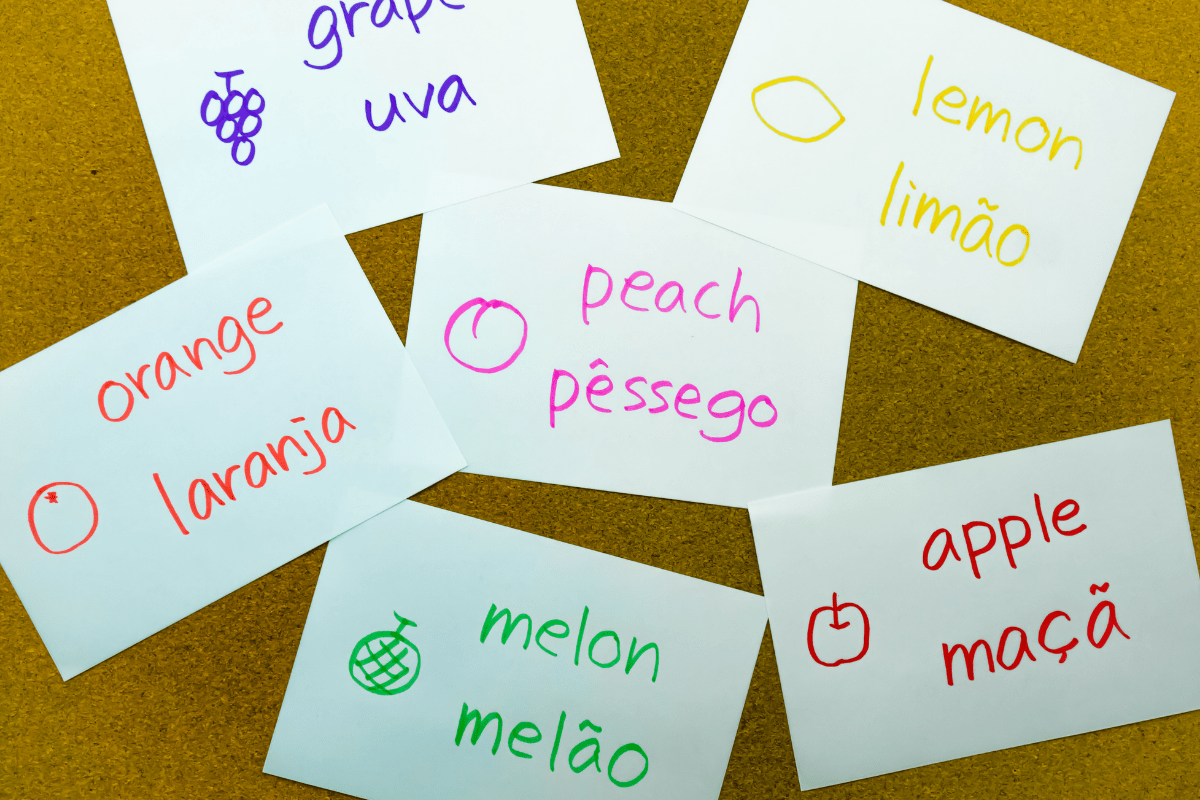Olá! One of the biggest challenges we had when moving to Portugal was learning Portuguese. If you’re considering a move to Portugal we would highly recommend that you begin your studies early.
Learning the language will make it easier to be part of your new community and feel comfortable in your new home or even when you’re just visiting.

We want to help you along with your language learning by sharing some tips on learning Portuguese that have helped us. We hope they help you too.
1. Learn European Portuguese
This probably is THE most important tip to know. There is a big difference between European Portuguese and Brazilian Portuguese. Be sure whatever video, course, or book you pick on language learning is about European Portuguese.
Even Google translate only has Brazilian Portuguese – which is helpful but will not be one hundred percent accurate. Just be aware of it.
2. Start Early
If you are planning on visiting or moving to Portugal the good news is that you can get started before you arrive. There are many books and many online Portuguese courses available to begin to learn European Portuguese.
One of the best resources we’ve found for learning Portuguese is Portuguese with Carla. In fact, we have enjoyed the program so much that we signed up to be part of their affiliate program. If you use one of our links to sign up you get a special discount and we get a small commission that costs you no additional fees. It’s just their way of thanking us for leading you to them.
We think that Carla and her husband Marlon have designed just about the perfect program for learning Portuguese. They incorporate a movie called “The Journey” that you watch and follow along with the story. The movie takes you on a sort of treasure hunt throughout Portugal. You learn Portuguese the way people really speak it and get a chance to gain practical cultural insights as well. In between, you’ll get vocabulary lists, audio segments to listen and speak along with, fun grammar instruction, ways to quiz yourself and consolidate your learning, and even homework!
They also have gamified the learning making one of the hardest languages to learn actually fun and cheery. You can earn “escudos,” the Portuguese currency before they adopted the euro, for participating in some activities. These can be used to get bonus content, additional course materials, and other surprises.
Whether you are an auditory, visual, or kinesthetic learner this program will work for you.
Check out this short video from Carla and Marlin with some tips on memorizing Portuguese vocabulary.
They also offer supplemental videos, a podcast, forum discussions, and live practice sessions to their students. Most importantly they make it fun and easy to learn the language. We’ve tried other methods and programs, but this is the one that is far and away the best for us. You can get a free week to try The Journey and see if you like it too.
3. Repetir, Repetir, Repetir
Repeat, repeat, repeat. Any lessons that you do take, be sure to do them over and over again. It may seem silly but it really works. The more you repeat words and phrases the more your brain and tongue get used to this new strange (to you) language.
Many of us who are making the move to Portugal are a bit older. Many older people think they can’t learn a language and that it’s just too difficult. I’m not going to lie. It’s not a walk in the park. But then again, anything worth learning is worth putting in the time and effort. Right?
I’ve found that giving ourselves a little Portuguese treat after completing a chapter or quiz is a terrific incentive for us! It can be a delicious Portuguese pastry or going out for a walk to enjoy a beautiful Portuguese day.

4. Don’t Speak English
It sounds simple but it’s actually hard to do once you get here. When someone hears your American or British accent they immediately start speaking English or hand you a menu in English. I always say don’t worry I’m doing my best to learn YOUR language you don’t need to learn mine.
Since there are many English-speaking tourists and residents English is pretty widely spoken in most of the larger cities in Portugal. Once you get out into the smaller villages and towns it does get a bit tougher to find English speakers.
Our advice is to give it a try and use your Portuguese every single time you can. Again it’s part of the repeat, repeat, repeat process.

5. Make Some Flashcards
For those of you old enough to remember them, flashcards are still a great way to learn. Sure you can buy them but we’ve made our own on index cards. We hang them up around the house on things. Like “cozinha” for kitchen. You get the idea. We take them down when friends come over which is always another fun game of putting them back where they belong.
As we see them around the house we say them silently and out loud. Our cats may be learning a bit of Portuguese, too. We talk to them both in Portuguese and they look at us the same as they always have, so we’re sure they know we’re still their moms.
6. Read Children’s Books and Comic Books
Instead of trying to start with books you’d typically read try reading kid’s books. Especially stories you may already know. We purchased The Little Prince in Portuguese which is always fun to read.
Books with pictures and photos make it even easier to follow along.
Many of the grocery stores in Portugal have inexpensive books and comic books you can pick up.
An added bonus is that you can donate them to a book collection when you’re done with them.
7. Pick Up All The Grocery Store Advertisements and Read Labels
Some of the things we learned quickly were the groceries items that we buy frequently. It was important when we first arrived to be sure we were actually buying what we thought we were buying. To be honest, we made a few mistakes in the beginning by purchasing things that didn’t have salt or did have salt, things like that. Nothing was catastrophic but it sure helped us learn new words like “com” means “with” and “sem” means “without,” as in salt or “sal.” See how easy that was?
Every week we pick up all the circulars for the next week and beyond. Not only do we learn what’s on sale but we study them like schoolbooks. The good news is that there are typically pictures that help you identify the objects. One of the quirky things about Portuguese is that there are sometimes multiple words for the same thing. The weekly brochures become practical visual dictionaries to help us sort those things out.
Following the papers, we learn something new every week. Plus you’ll learn more about the local foods and what is in season.
8. Watch Local Portuguese TV
You can watch the local television stations and get a real dose of the language. You may not be able to follow everything but you will be able to pick out a few words and do some research to figure out the rest.
Watching local sitcoms and soap operas is also fun. You’ll get the gist pretty quickly and may even get caught up in the stories. Kids’ cartoons and shows are usually pretty easy to follow too.
There are also many movies and shows available on streaming in Portuguese.
We’ve been watching two shows on Netflix, “Gloria” and “Until Life Do Us Part” that are in Portuguese. We put on the closed captioning and pay attention to the words. We learn more about the culture and history of Portugal and get a good language lesson at the same time.

9. Don’t Give Up on Learning Portuguese
This is by far the most important tip. Many people say that Portuguese is one of the hardest languages to learn. We don’t know if that’s true, but we do know that if you really put your mind to it you can learn just about anything. We’ve changed careers and jobs several times in our lives. All were necessary, all were difficult at the time but in looking back we always made a change for the better. We think of learning Portuguese like a new job something we must master – no excuses.
Find someone who can help hold you accountable. If you’re in Portugal find a Portuguese friend who will correct you and help you. Most of all be kind and patient with yourself. You will get there in your own time.
Start today and turn Portuguese into one of the best languages to learn for you.
Obrigada por ler! (Thanks for reading!)
Pin It For Later!






3 Comments
Thanks for your detailed comment. It is important to know that European Portuguese and Brazilian Portuguese can be quite different. Thanks for sharing your experience. And yes, we have learned that just about every town in Portugal even the very small ones have a special pastry. We love discovering each one of them.
I learned Portuguese in college and studied in Portugal in 1990-91. While I could speak, read, write when I arrived to Portugal, I had a devil of a time understanding spoken Portuguese. I studied in Lisbon and back then while there were people who spoke English, it wasn’t as prevalent as it seems to be today.
May I suggest that on your flashcards that you hang around the house, you also write the “phonetic” pronunciation of how you would say something using American sounds. Like cozinha: koh-zee-nah, like banana: bah-nah-nah. People tend to not realize that the Portuguese alphabet sounds different than the English alphabet especially vowel sounds. Also it would be very good to leave your flashcards up while people visit so other non-Portuguese speakers can learn and native Portuguese speakers can also help. (Every region in Portugal has a dialectal difference…so you might run into that with native speakers raised outside of Lisbon.
Cascais/Estoril areas are the largest expat communities in PT and the most expensive areas. I would suggest to your readers that if they want to learn Portuguese faster, go to places like Guimaraes, Braga, Braganca, eastern side of the country near Castelo Branco…where are not as many English speaking Portuguese. There are still plenty of expats in those areas and people can make friends easily.
If people are looking for universities in the states to take Portuguese classes before they leave the vast majority of them teach Brazilian Portuguese because it is easier for students to u understand the ‘pronounce every letter’ of a word instead of ‘eat letters of words’ in European Portuguese. However, all is not lost…the universities have professors and use teaching assistants who speak with different accents of each country. For example, I attended UW-Madison for college (1987-1990 and after I returned from PT). All was not lost, I learned which professors and teaching assistants had European accents and I learned the accents. They knew my passion to learn European PT, so they ensured that I knew the differences in grammar between the two flavors. (Just like British and American English use different spellings, different words, some grammar variations…same as Brazilian Portuguese/ European Portuguese.) The most important difference is the accent as well as some idiomatic expressions….but due to Brazilian soap operas, Portuguese tend to understand the Brazilian speech patterns. The hardest thing for someone who learned Brazilian Portuguese is to understand the sounds of European PT. So in the US, you can learn at Am universities emphasizing Brazilian Portuguese, just ensure you have European accent speakers.
There is a special different pastry in each city/village in Portugal. Azeitao, a small village in PT, has delicious pastries you should find.
I love reading your posts! You have great tips here for sure. I think the key when trying to learn a new language is to fully immerse yourself in the culture. I cant wait to see what other adventures you take us on through Portugal!